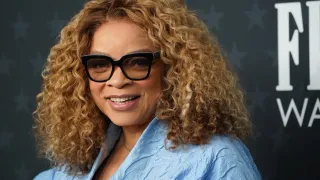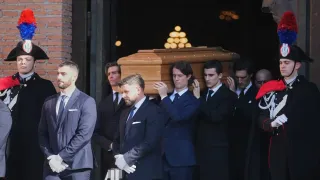November 16, 2018
The Ballad of Buster Scruggs
Greg Vellante READ TIME: 3 MIN.
The immediate moment we hear the first strum of Carter Burwell's western score against an image of a leather-bound storybook titled "The Ballad of Buster Scruggs," it's clear we're in good hands. Joel and Ethan Coen are about to tell us a story -- six stories, in fact. In the filmmakers' first anthology film, the brothers tackle the comicality, cruelty and sheer vastness of the wild, wild west with their usual scrutiny of the human condition and all its many flaws. Akin to 2010's "True Grit" and 2007's "No Country for Old Men," the Coens' affinity for placing fascinating characters amidst enormous western landscapes is clear with each subsequent story they tell. We see the world first, and then the characters within it.
The book opens up to reveal an illustration, followed by the opening page of the first story -- "The Ballad of Buster Scruggs." A bright and sunny landscape is accompanied by Tim Blake Nelson's titular character riding a horse while gleefully singing a song about quenching his thirst with some "cool, cool water." Buster speaks directly toward the camera. He engages in some twistedly humorous murders. He sings another song after killing a bar bully (the great Clancy Brown) in cold blood via the most inventive way possible. It's all in a day's work for the Coens, crafting a kooky character living in an even stranger environment. There's even a third tune to cap things off during the story's inexplicably bizarre final moments.
'Buster Scruggs' is an absolute blast, but it's simply an appetizer for the hearty narrative meat and potatoes to come. Unfortunately, the film's weakest story, "Near Algodones," follows as the sophomore tale. Starring James Franco as a bank robber subject to the perils of frontier justice, the yarn is a thankfully quick affair that admittedly has a great stinger of a final gag, as dark as it may be.
It's simply a transition into one of the film's best entries, "Meal Ticket," where the movie begins to meander into the deep end of anecdotal decadence. It's a simple yet tragic tale of a sideshow owner (Liam Neeson) and his "attraction," a no-armed, no-legged thespian (Harry Melling) who never speaks outside of his performances, during which he delivers thrillingly executed dramatic monologues like Percy Shelley's "Ozymandias" and Abraham Lincoln's Gettysburg Address for townies looking for some evening entertainment. The story is sad and transfixing with a brilliant performance by Melling, and it's the first to truly dig into the depravity of the west and the men who wandered it looking for a quick buck.
This examination of greed continues into "All Gold Canyon," a massively entertaining segment starring Tom Waits as a prospector searching for gold. In "The Girl Who Got Rattled," the film's longest and arguably strongest piece, romance and tragedy intertwine in beautiful ways, anchored by strong performances by Zoe Kazan and Bill Heck. In the final chapter, playing out like a chamber play as five passengers dialogue during a carriage ride, "The Mortal Remains" is a fantastic and off-kilter wrap-up that both summarizes everything we've seen before and serves as a worthy singular entry on its own accord.
When the film ends and the book closes, it's clear that "The Ballad of Buster Scruggs" never would've worked as the anthology Netflix series it was intended to be originally. One wonders how much extra footage is out there, considering this was conceived as a six-episode affair (given that all the segments in the film are of different lengths), but the movie works far better as a continuous stream of stories as opposed to a broken-up collection of tales. The order is entirely intentional and helps the film flow from light to dark as its minutes progress. Each story is different and offers up a unique slice of the Coens' style, both in the writing and filmmaking, and as a result, one can discern specific elements of so many previous works by the brothers.
For fans of these specific artists, "The Ballad of Buster Scruggs" is an undeniable treasure trove of their typical pleasures and poignancy. For fans of storytelling as an art form in and of itself, this is the equivalent of curling up with a great book and letting your imagination take hold. The Coens have crafted a series of adult bedtime stories -- you can practically hear the rocking chair creaking and the pages turning as you watch -- and their story-spinning dynamism feels like added kindling to a warm fire one would sit by as they lose themselves in a damn good yarn. And I'll be damned if "The Ballad of Buster Scruggs" isn't one.






